Picture this: you turn on your kitchen tap, pour a glass of water, and take a sip—confident it’s clean, safe, and ready to drink. But what if we told you that the way Perth handles liquid waste could be the reason your water stays that way?
In a city known for its dry climate and reliance on limited groundwater, protecting Perth’s water supply isn’t just about rainfall or dams. It’s also about what we pour down the drain, pump out septic tanks, and flush away from industrial sites. The less-visible process of liquid waste disposal plays a direct, vital role in keeping our water sources safe—and it’s something most of us rarely think about.
The Silent Threat Beneath Our Feet
Perth’s drinking water primarily comes from groundwater aquifers, supplemented by desalination and surface water. Groundwater is stored beneath the earth’s surface in porous soil and rock formations. It’s a clean, natural source—but also incredibly vulnerable to contamination.
That’s where liquid waste becomes a risk. From household greywater and septic tank sludge to industrial chemicals and oils, liquid waste can seep into the ground if not properly managed. And once harmful substances reach the water table, they’re hard—and expensive—to remove.
In simple terms: the same liquid waste that leaves your property or business could eventually find its way back into your drinking glass if disposal systems fail.
More Than Just a Pipe Problem
Liquid waste doesn’t disappear when it’s flushed away. It goes somewhere. And whether that “somewhere” is a treatment facility or an illegal dump site makes a massive difference.
Perth’s population is growing, and so are its residential developments, hospitality venues, and manufacturing operations. That means more waste—and more complexity. Grease traps at restaurants, oily runoff from car washes, and chemical by-products from small factories are just a few examples of liquid waste that needs proper treatment.
When this waste isn’t handled by certified professionals or is dumped irresponsibly, contaminants like nitrogen, phosphorus, heavy metals, and pathogens can leach into groundwater or flow into rivers. This not only threatens water quality but also aquatic ecosystems and public health.
Why Businesses Hold the Key
Here’s where it gets practical—and surprisingly powerful. Local businesses have an outsized role to play in protecting Perth’s water. The way they store, transport, and dispose of their liquid waste matters.
For example, a single mismanaged grease trap at a busy café can cause clogs, overflows, and contamination risks that ripple beyond the property line. Similarly, industrial waste containing solvents or oils, if dumped without treatment, can create long-term environmental damage and legal headaches.
It’s not just about compliance with local regulations—it’s about stewardship. When businesses partner with licensed waste disposal services, they don’t just avoid fines. They actively contribute to keeping the city’s drinking water safe.
This is where liquid waste disposal Perth becomes more than a search term. It’s a civic responsibility.
The Consequences of “Out of Sight, Out of Mind”
There’s a cultural challenge, too. Liquid waste often falls into the “out of sight, out of mind” category. People assume that what leaves their sink, workshop, or floor drain is handled somewhere else, by someone else.
But improper disposal—whether it’s dumping used motor oil into a stormwater drain or failing to service a septic tank—can undo years of investment in water protection efforts. Once contaminants enter the system, cleanup is costly, and damage to natural water sources can last decades.
In Perth, where rainfall is unpredictable and climate change is tightening water supplies, we can’t afford these kinds of mistakes.
A Smarter System Starts With Awareness
So what can be done? The good news: Perth already has a strong framework for managing liquid waste. Licensed contractors, water management authorities, and environmental agencies all play their part. But the system only works when individuals and businesses engage with it.
This means:
- Choosing certified liquid waste contractors for septic pump-outs and industrial cleanups
- Scheduling regular grease trap maintenance and record-keeping
- Disposing of chemicals through official hazardous waste channels, not the bin or drain
- Educating staff on what not to pour down the sink
It’s not glamorous work, but it’s essential. A well-maintained waste system means fewer leaks, spills, and risks to our groundwater. It also means we reduce the need for expensive water treatment down the line—savings that benefit everyone.
The Bigger Picture: Waste and Water Security
In the face of population growth and a changing climate, water security is a long game. It’s about ensuring future generations in Perth can turn on the tap without worry. And while desalination and conservation campaigns are part of the answer, so is something much less talked about: waste.
Liquid waste management is, at its core, a protective layer. It stops the bad stuff from ever reaching the good stuff. And in a city like Perth—where aquifers are lifelines—that protection is non-negotiable.
So the next time you enjoy a cold glass of water or run a bath, remember: clean water doesn’t just happen. It’s defended—quietly, constantly—by those who manage what we leave behind.
And that’s worth thinking about.






